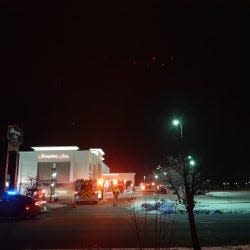Plastic bag covered air intake on pool heater, may have led to Marysville hotel illnesses

A plastic bag blocking the fresh-air intake at the pool heater equipment room may have caused the heater to fail and led to the carbon monoxide build-up on Jan. 29 that sickened 16 people at the Hampton Inn in Marysville, according to a report from the Ohio State Fire Marshal's office.
Inspector Bradley Merillat with the State Fire Marshal's office was among officials who did a follow-inspection of the hotel on Jan. 31 after the Marysville Fire Department gave the hotel permission to reopen.
When Merillat inspected the pool equipment room, “it was found to have a plastic bag over the fresh-air intake," according to his report. He also noted that the carbon monoxide (CO) detector in place was not functioning.
Marysville and other fire departments responding to the 911 calls found CO levels at or about 1,100-1,300 parts per million (PPM) in pool area and on the first floor, 600 PPM on the second floor, and 500 PPM on the third floor, the report said.
CO concentration at such levels “can be lethal if you’re in that setting for too long,” said Battalion Chief Cole Tomlin with the Marysville Fire Division. He added that other guests at the hotel could have become sick — or worse — if the leak had not been reported that afternoon and everyone had gone to sleep that night.
Marysville Hampton Inn closes: Marysville Hampton Inn remains closed after suspected carbon monoxide leak hospitalizes 11
Pool heater failure led to potentially lethal carbon monoxide leak
In the week leading up to the CO poisoning incident, Merillat reported, hotel general manager Justin Graham said the pool water temperature was decreasing. Maintenance was in the process of switching the water heaters (the spa heater to the pool heater).
When maintenance attempted to switch the water heaters, “an issue occurred with blowing a fuse(s) and required another maintenance person to come from another facility,” the report said.
Graham said maintenance personnel were able to get the heater working two days before the leak that sent emergency responders to the hotel, the report said.
But Merillat examined the pool equipment room on Jan. 31, he found a plastic bag blocking the fresh-air intake, which could create a critical carbon monoxide problem for a natural-gas pool heater or any other device with combustible fuel.
Moreover, Merillat discovered that the CO detector was not working at the time of the leak. A new detector had been installed in the equipment room when Merillat came in to inspect the space, and the device alerted immediately upon a functioning check.
Graham did not respond to calls from The Dispatch for comment.
Ohio’s building and fire codes do not mandate the installment of CO detectors in pool areas. But the stakes are high for guests at potential risk for lethal exposures.
Across the country, there were 28 incidents and 12 deaths from 2005 to 2018 due to "unintentional (carbon monoxide) poisoning in hotels, motels, and resorts" as a result of natural gas swimming pool heaters, according to a 2019 article in Preventive Medicine Reports.
Hotel had been cited for multiple violations during previous inspection
The pool area at the hotel was not even supposed to be open that night, as Union County had ordered it shuttered for repairs on Dec. 13 due to the absence of chlorine in the pool, floor tiles that were craving in, and other issues.
"No authorization was obtained to begin using this area," Merillat said in the report.
Authorities have also alerted the hotel of other issues in recent months. In June 2021, the Hampton Inn was cited for several violations of the fire code, including fire doors being popped open, an unlocked fire alarm panel breaker and dry sprinkler system, and the lack of permanent wiring used to power electrical outlets.
Following the most recent inspection Jan. 31, Merillat's report said the hotel received another citation concerning an expired building department permit and unapproved worked done to the electrical and plumbing systems.
The Hampton Inn has until Tuesday to address these issues. And the State Fire Marshal's office has scheduled a re-inspection for February 15.
Yilun Cheng is a Report for America corps member and covers immigration issues for the Dispatch. Your donation to match our RFA grant helps keep her writing stories like this one. Please consider making a tax-deductible donation at https://bit.ly/3fNsGaZ.
This article originally appeared on The Columbus Dispatch: Carbon monoxide: Blocked air intake at Marysville hotel pool heater
